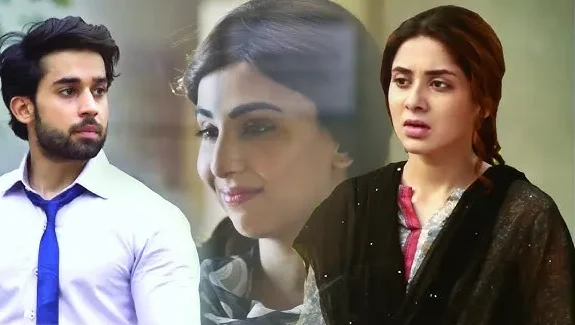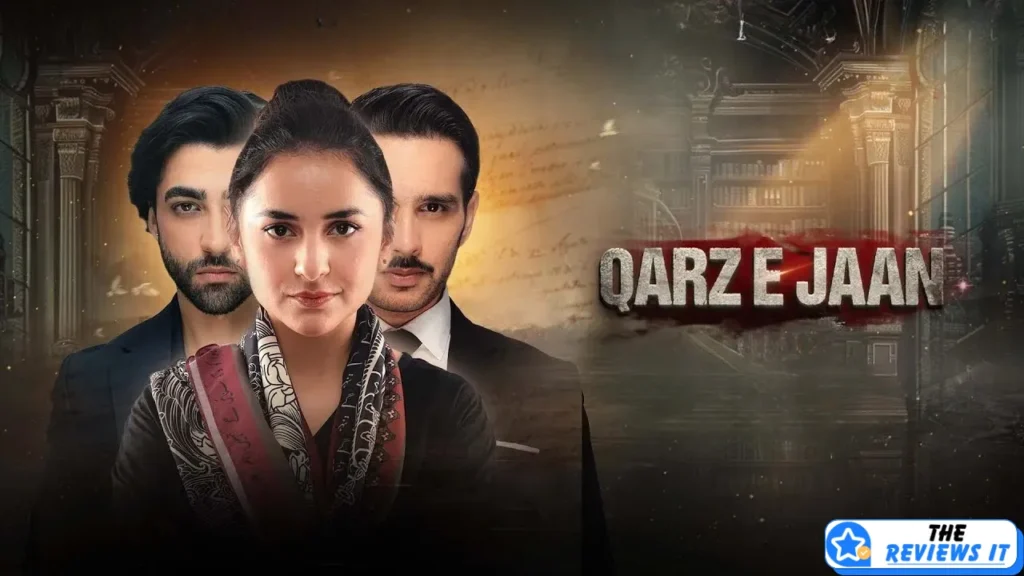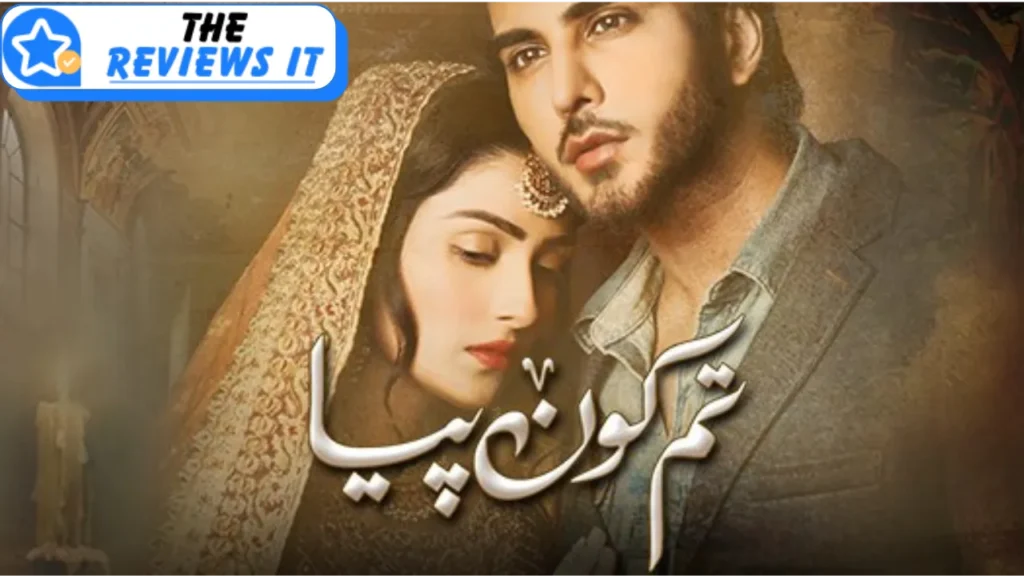Balaa is a gripping 2018 Pakistani thriller that delves deep into the complexities of human nature, insecurity, and vengeance. Airing on ARY Digital, this drama leaves its viewers both intrigued and disturbed by the dark journey of its protagonist, Nigar. The story revolves around Nigar, a girl with a disability, who lets her insecurities and cruel nature destroy the lives of those around her. Produced by Fahad Mustafa and Dr. Ali Kazmi under the Big Bang Entertainment banner, Balaa brings a thrilling narrative, with outstanding performances by a stellar cast, including Ushna Shah as the manipulative Nigar and Bilal Abbas Khan as the unsuspecting Taimoor.
In this Balaa Drama Review, we will explore the intriguing plot, character dynamics, and the eerie themes of love, betrayal, and revenge that make this drama an unforgettable watch.

Plot Overview: The Twist of Fate in Balaa
Balaa follows the story of Nigar (Ushna Shah), a cruel and selfish woman who has been physically impaired by a limp since birth. Rather than accepting her disability, Nigar uses it as an excuse to manipulate and destroy the lives of those around her. Her actions stem from her father’s (Sajid Hassan) influence, a man who shares her ruthless mindset and has always favored her over his other son, Junaid (Asad Siddiqui).
Nigar’s first target is her cousin, Taimoor (Bilal Abbas Khan), a successful man who is in love with Saba (Azekah Daniel). Nigar, jealous of their relationship, plots to separate them. She manipulates situations, causing Saba to elope with her boyfriend and turning Taimoor’s world upside down. Nigar’s cruelty doesn’t stop there—she also torments Junaid’s wife, Zeba (Ammara Chaudhary), eventually driving her to a tragic death, further deepening the chaos in the family.
As Nigar marries Taimoor, she starts to destroy his family from within. She manipulates his mother, Shama (Samina Peerzada), and his younger sister, Batool (Mehar Bano), using emotional tactics to isolate Taimoor from them. As she systematically eliminates members of Taimoor’s family, her sinister plans unfold, and she continues her path of destruction.
Eventually, the truth about Nigar’s malicious deeds is uncovered, and Taimoor, filled with rage and heartbreak, seeks revenge. In a final twist, he marries Saba and, with her help, exposes Nigar’s wrongdoings, leading to her downfall as she is confined to a mental hospital.
The plot of Balaa is a whirlwind of deception, betrayal, and vengeance, with each twist revealing just how far Nigar will go to fulfill her selfish desires, making it a chilling exploration of the dark side of human nature.
fill her selfish desires, making it a chilling exploration of the dark side of human nature.
Characters and Performances: Who Delivered the Best Performance?
Balaa features a strong ensemble cast, with each actor delivering an intense and memorable performance that truly brings the dark narrative to life. Let’s dive into the key characters and standout performances.
- Nigar (Ushna Shah)
Ushna Shah delivers a chilling performance as Nigar, a woman who allows her insecurities and physical disability to fuel her cruelty. She portrays Nigar with a disturbing mix of vulnerability and viciousness, making it impossible to ignore her toxic presence. Ushna masterfully captures Nigar‘s emotional turmoil, turning her into a character the audience loves to hate. Her performance is undeniably the backbone of the series, anchoring the show’s drama and tension. - Taimoor (Bilal Abbas Khan)
As Taimoor, Bilal Abbas Khan presents a character caught between love, heartbreak, and eventual revenge. His performance is both tender and anguished, especially in his scenes with Nigar and Saba. Bilal successfully conveys the inner conflict of a man betrayed by his wife, and his evolution from a loving husband to a vengeful force is both believable and compelling. - Saba (Azekah Daniel)
Azekah Daniel shines as Saba, the innocent love interest who is torn between loyalty to Taimoor and her own survival. Azekah’s portrayal is heartfelt, bringing a sense of innocence and resilience to her character. She plays the role of the supportive and understanding woman with grace, making her the perfect counterpart to Taimoor. - Shama (Samina Peerzada)
Samina Peerzada brings her veteran acting skills to the role of Shama, Taimoor’s mother. She plays a loving, gentle woman who is emotionally manipulated by Nigar. Samina does an excellent job of portraying Shama’s gradual deterioration as she distances herself from her son, all while still maintaining a core of maternal love that is impossible to ignore. - Zafar (Sajid Hassan)
Sajid Hassan plays the role of Zafar, Nigar and Junaid’s father. As a man who has spoiled his daughter and shares her cruel outlook on life, Sajid brings a sense of cold authority to the character. He is the enabler of much of Nigar’s actions, and Sajid’s portrayal effectively adds weight to the toxicity of the family dynamic. - Batool (Mehar Bano)
Mehar Bano plays Batool, Taimoor’s younger sister, who is perceptive enough to understand Nigar’s true intentions. Mehar brings a refreshing dose of intelligence and skepticism to her character, and her chemistry with Bilal Abbas Khan is natural and believable, adding depth to her role. - Junaid (Asad Siddiqui)
Asad Siddiqui plays Junaid, Nigar’s brother, who becomes increasingly disillusioned with his marriage to Zeba and his role within the family. Asad captures the essence of a man torn by guilt and confusion, adding layers to the character as his journey intertwines with the darker events of the drama. - Saleha (Mehwish Qureshi)
Mehwish Qureshi portrays Saleha, Taimoor’s older sister, who is initially unaware of the dangers lurking within her family. Mehwish successfully brings an air of naivety to her role, which makes her eventual fate all the more tragic.
The performances in Balaa are strong across the board, with Ushna Shah leading the way with her intense and chilling portrayal of Nigar. Bilal Abbas Khan, Azekah Daniel, and Samina Peerzada also deserve special mention for their performances, each contributing to the emotional and dramatic weight of the series. The chemistry between the actors enhances the story’s tension and keeps the audience engaged, making Balaa a standout thriller in Pakistani television.

Cast Names and Character
| Cast Name | Character |
|---|---|
| Ushna Shah | Nigar; Disabled (limps from birth), Taimoor’s cousin and later wife, Shama’s niece |
| Bilal Abbas Khan | Taimoor; Nigar’s husband, later married Saba |
| Azekah Daniel | Saba; Taimoor’s love interest and later second wife |
| Samina Peerzada | Shama; Taimoor’s mother, Nigar and Saba’s aunt |
| Sajid Hassan | Zafar; Nigar and Junaid’s father |
| Mehar Bano | Batool; Taimoor’s younger sister, Junaid’s wife |
| Asad Siddiqui | Junaid; Nigar’s brother, Batool’s husband |
| Mehwish Qureshi | Saleha; Taimoor’s elder sister |
| Ammara Chaudhary | Zeba; Junaid’s ex-wife |
| Ismat Zaidi | Saba’s mother, Shama’s friend |
| Farah Nadeem | Saleha’s mother-in-law |
Themes and Messages: The Dark Side of Human Nature
Balaa explores several deep and disturbing themes that delve into the darker aspects of human nature. The drama tackles issues like revenge, betrayal, and morality, all while shedding light on the complexities of human relationships and the consequences of unchecked ego and cruelty.
- Revenge and Its Destructive Power
At its core, Balaa is a story of revenge, and how it consumes the lives of those involved. Nigar‘s quest for revenge against those she perceives as having wronged her leads to a series of manipulative and deadly actions. The show paints a grim picture of how a desire for retribution can spiral out of control, causing pain not just to the intended victims but to the perpetrator as well. Taimoor, in the end, becomes the instrument of Nigar’s downfall, showing how revenge can often come full circle, leaving no one unscathed. - Betrayal and Deception
Betrayal is another recurring theme in Balaa. Nigar betrays the trust of her loved ones, particularly Taimoor, and manipulates everyone around her for her own benefit. Her deception extends to her family, her love interests, and even her own father. The drama shows how betrayal can destroy relationships, leaving a trail of emotional wreckage in its wake. Taimoor‘s eventual betrayal of Nigar in the pursuit of justice highlights the cyclical nature of betrayal within toxic relationships. - Morality and the Price of Immorality
One of the most striking aspects of Balaa is its exploration of morality. Nigar, despite her actions, believes that she is justified in her cruelty, while Taimoor represents the contrast—a man who tries to live morally but is eventually driven to immorality by the relentless hurt he experiences. This duality of characters prompts viewers to question the boundaries of good and evil, and whether actions can ever truly be justified if they come at the cost of others’ well-being.
Through these themes, Balaa paints a haunting portrait of how human nature can be twisted by insecurity, greed, and pain, and the destructive consequences that follow.
Pacing and Direction: Keeping the Audience Engaged
The pacing and direction of Balaa play a crucial role in maintaining the suspense and keeping the audience hooked from start to finish.
- Building Suspense
The drama is built around a slow-burn suspense that escalates with each episode. From Nigar‘s manipulations to the tragic events that follow, the show keeps the tension high, ensuring that viewers are constantly on edge. Each plot twist adds to the suspense, especially as Nigar’s actions unfold and the extent of her manipulations are revealed. The pacing is deliberate, allowing for moments of emotional intensity to shine while maintaining a steady buildup of suspense. - Engaging Character Arcs
The pacing of the drama is tightly linked to the development of its characters. As Taimoor‘s and Nigar‘s stories evolve, the drama makes sure to build their personal conflicts in a way that is both gradual and impactful. The shifts in Taimoor‘s character from a naive lover to a revenge-driven man are executed thoughtfully, ensuring that the audience remains invested in his journey. Similarly, the steady unraveling of Nigar’s true nature keeps viewers intrigued as they witness her manipulative schemes unfold. - Tension in the Direction
The direction of Balaa, under the guidance of the creative team, plays a vital role in building tension. The use of atmospheric music, strategic camera angles, and dramatic pauses all contribute to a sense of unease, which is crucial for a psychological thriller like Balaa. The show’s direction effectively complements its storyline, using visuals and sound to accentuate pivotal moments, especially when secrets are exposed, or characters face turning points. - Pacing with Purpose
While Balaa can be slow at times, particularly in its early episodes, this pacing works to its advantage by giving each character and plotline time to breathe. This makes the moments of high drama and action feel earned rather than forced. The deliberate pacing allows for moments of reflection and growth, making the climactic scenes all the more satisfying when they finally arrive.

In conclusion, Balaa excels in its pacing and direction. It uses suspense-building techniques and a careful balance of character development to keep viewers hooked throughout its entire run. The show’s tension is palpable, and its direction ensures that each twist hits the audience with the intended emotional and psychological impact.
Strengths and Weaknesses: What Worked and What Didn’t
Balaa is a compelling drama that brings together strong performances, a gripping plot, and a haunting exploration of human nature. However, like any show, it has its highs and lows.
Strengths:
- Strong Performances
The standout feature of Balaa is its powerful performances, especially from Sarah Khan as Nigar. Her portrayal of a woman driven by revenge and ego is both chilling and captivating. Bilal Abbas Khan also impresses as Taimoor, delivering a nuanced performance that balances love, pain, and eventual rage. - Intriguing Plot
The drama’s plot, revolving around revenge, betrayal, and morality, keeps viewers hooked. The narrative has just the right amount of twists and turns, ensuring that the audience is always invested in the outcome. - Atmosphere
The show’s atmosphere—dark, tense, and sometimes claustrophobic—adds significantly to its appeal. It reflects the internal struggles of the characters and complements the psychological themes explored throughout.
Weaknesses:
- Pacing Issues
While the slow burn adds tension, at times the pacing feels dragged out, especially in the early episodes. Some viewers might feel the buildup could have been more compact, and certain plot points could have been introduced earlier to maintain momentum. - Over-Exaggeration of Emotions
Some scenes lean heavily into melodrama, particularly when it comes to character emotions. This over-the-top display of emotions, though effective for some, can feel a bit forced for others, detracting from the authenticity of the characters’ experiences. - Predictability at Times
Although the twists are generally well-executed, certain plot developments can be anticipated, especially for viewers accustomed to thrillers in this genre. This makes the drama slightly predictable despite its overall suspenseful appeal.
Audience Reception: How Did Viewers Respond to Balaa?
Audience response to Balaa has been mixed, with many praising its strong performances and dark storytelling. The standout performance of Sarah Khan as the villainous Nigar was widely lauded, as viewers were both shocked and fascinated by her character’s descent into madness.
However, some viewers felt the slow pacing in the early episodes was a turn-off, and the melodrama was seen as a drawback by others. Despite these criticisms, the show has enjoyed strong viewership, particularly among fans of psychological thrillers and emotional dramas.

Controversies surrounding the drama mainly stemmed from its portrayal of toxic relationships and the intense emotions of its lead characters, which some found a bit too heavy-handed. The drama sparked conversations about morality, revenge, and whether the story was a reflection of real-life toxic behavior.
Cinematography and Music: Enhancing the Dark Atmosphere
The cinematography of Balaa is one of its strongest assets. The use of muted colors, tight close-ups, and dramatic lighting heightens the tension and unease throughout the series. Each frame feels deliberate, reflecting the inner turmoil of the characters. The dark, shadowy lighting mirrors Nigar’s twisted nature, while lighter moments are used sparingly to contrast the darker themes of the drama.
The music complements the eerie tone of the show, with a haunting score that intensifies the emotional moments. The music adds to the psychological thriller aspect of Balaa, making the tension feel more palpable. The combination of music and cinematography effectively pulls the audience into the world of the characters, amplifying the drama’s core themes of revenge and emotional destruction.
Plot Twists and Surprises: What Took Us by Surprise?
One of the most shocking twists in Balaa comes when Taimoor finally takes the decision to go against Nigar, marking a significant turning point in the drama. His journey from a man manipulated by Nigar to a person who seeks justice and redemption is filled with surprising and emotional moments.
Another surprising element is the revelation of Nigar’s past and her complex motivations. As her true nature is uncovered, viewers are left shocked at the depth of her manipulation and the lengths she will go to maintain control.
While some twists might feel predictable, the emotional impact of each one is undeniable, and the show does a great job of delivering the unexpected when least expected.
Final Verdict: Is Balaa Worth Watching?
Balaa is definitely worth watching if you’re a fan of psychological thrillers and intense character-driven stories. The drama excels in creating a tense atmosphere and exploring the complexities of human nature. The strong performances, particularly by Sarah Khan, elevate the show, making it a gripping experience for those who enjoy dark and twisted narratives.
However, if you’re someone who prefers fast-paced, action-packed stories or finds melodrama off-putting, Balaa might not be for you. The slow pacing and occasional over-the-top emotional moments may deter some viewers, but for those who appreciate deep, thought-provoking stories with a psychological edge, Balaa offers plenty to enjoy.

Personal Opinions: My Take on Balaa
Personally, Balaa left me both fascinated and disturbed. Sarah Khan’s portrayal of Nigar was haunting and impossible to look away from, and I found myself equally rooting for and dreading her every move. Bilal Abbas Khan’s portrayal of Taimoor was a standout, especially in the way his character evolves from a passive victim to someone who takes control of his fate.
My favorite moments were the ones where Nigar’s true intentions slowly unraveled, as it kept me on the edge of my seat. However, there were times when the melodrama felt a little heavy, especially when the emotional stakes were cranked up too high.
Conclusion: Wrapping Up the Balaa Drama Review
In conclusion, Balaa is a dark, suspenseful drama that thrives on strong performances and a thought-provoking plot. While its pacing may be slow at times and its emotional scenes may feel overdone, the depth of its characters and the exploration of revenge and morality make it a compelling watch for fans of intense psychological thrillers. If you can appreciate a slow-burn story with complex characters, Balaa is definitely worth adding to your watchlist.










